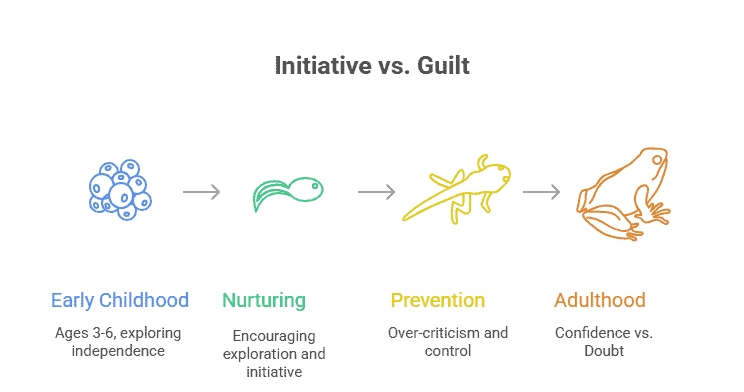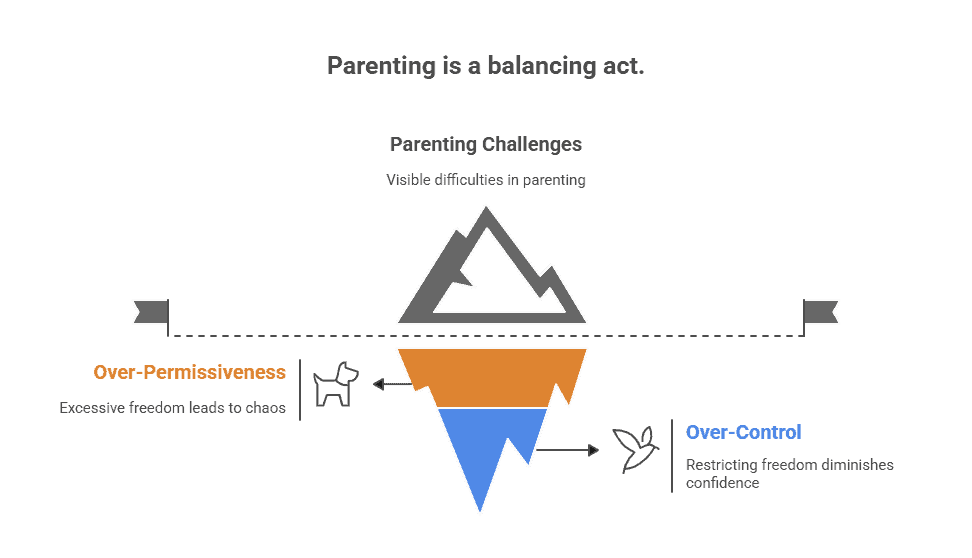What is the Initiative vs. Guilt Stage? According to Erik Erikson, it is a developmental phase that occurs between the ages of 3 and 6. During this period, children begin exploring their independence by planning activities, asking endless questions, and testing boundaries in every possible way. When nurtured with encouragement and support, they gain confidence and a natural drive to take initiative. However, if they are overly criticised, controlled, or discouraged, they may instead develop feelings of guilt, start doubting themselves, and grow hesitant to take the lead in future situations.
The parent or caregiver has a big role here, and the way they interact with the child sets that child either on a path toward lifelong confidence or toward lifelong doubt.

What is the Initiative vs. Guilt Stage?
Erikson’s psychosocial development consists of eight stages and lasts through an individual’s entire lifetime. The initiative versus guilt stage is the third one and takes place during the preschool years. Children are no longer satisfied with mere observations but want to direct the world.
Think of a 4-year-old deciding they are now the “boss” of the living room game. Initiative is that spark of leadership, the excitement of starting something new. But guilt can creep in when parents or caregivers shut down this spark too harshly—through criticism, punishment, or lack of encouragement.
At its core, this stage answers a simple but profound question children are silently asking: “Am I good or bad?”
Spotting Initiative in Action
Children in this stage are natural explorers. Signs that initiative is developing include:
- Declaring new ideas: “I’m opening a restaurant in the backyard!”
- Taking charge of play: assigning roles to siblings, cousins, or even unsuspecting pets.
- Eagerly trying new activities, whether it’s painting, climbing, or putting on a mini stage show.
Their nurturing results in the blossoming of confidence, budding problem-solving skills, and eventually leadership abilities.
Recognising the Weight of Guilt
On the flip side, children may show guilt when their efforts are constantly met with criticism or dismissal. Examples include:
- Apologising for small mistakes like spilling milk.
- Avoiding new activities out of fear of “messing up.”
- Withdrawing from play or refusing to share ideas.
Repeated guilt responses, when reinforced through the passage of time, plant seeds of insecurity and cause children to become overly cautious or hesitant to take initiative later in life.
The Crucial Role of Parents and Caregivers
Parenting during this stage often feels like walking a tightrope: give too much freedom, and chaos reigns; give too little, and confidence shrinks.
Encouraging Exploration
Safe opportunities should be offered for children to try, fail, and then try again. Whether it may be baking muffins (yes, even if the kitchen looks like a flour bomb went off) or building a fort, it is best to let them take the lead.
Setting Gentle Boundaries
Children need limits, but they need an explanation as well. A calm explanation, such as “You can climb on the playground, but not on the dining table,” sands the lesson much better than a harsh “No!” ever could.
Avoiding Excessive Criticism
Mistakes are part of the package. Instead of “Why did you do it like that?” try “I see you tried—let’s figure out another way.” This reframing keeps curiosity alive.
Supporting Autonomy
Letting children choose between two outfits or pick the bedtime story may seem small, but these choices signal trust in their decision-making abilities.
The Long-Term Ripple Effect

If a person manages this stage well and arrives at the end, the star at the other end of this voyage is the belief that one`s ideas and actions really matter, jailed in the word purpose. Children having initiative want much more willing to take challenges, lead others, and recover from setbacks.
But the same guilt continues for another rippling phase of adolescence and adulthood. An adult who did not feel encouraged will hesitate taking risks, will crystallize doubts in any action they do, and will fear disappointing others. That preschool level rationalization of self-worth—”Am I good or bad?”—can echo for decades if it remains unresolved.
What Adults Can Do If Guilt Still Lingers
Many adults don’t realise that unresolved patterns from childhood, especially from the initiative vs. guilt stage, can quietly shape their lives for years. Suppose guilt took the upper hand early on. In that case, you might find yourself hesitating to start projects out of fear of failure, struggling to take ownership of your decisions, or avoiding leadership roles even when you’re fully capable.
So, the great news is that the script can be rewritten. Practising self-compassion turns mistakes into evidence of an attempt and never into moral failures. Hobbies, when taken to their extremes, may become fuel for creativity, which gives the soul of wandering freedom from the shackles of perfection. Encouragers create an environment that nurtures opportunity for growth rather than stifling it.
And if guilt feels too heavy to handle, therapy will be that invaluable helping space to rebuild the courage to initiate, reinforce self-confidence, and strengthen the means to actually go for meaningful goals.
Why Therapy Matters Here
We generally believe therapy is meant for “big problems.” It can be a safe place to go back to an old wound or go through the process of healing it when it was already formed during some childhood stages, like this case. Therapists will help parents and adults recognise guilt-based thinking, replace it with healthier alternatives, and find ways to develop their own initiative.
Therapy offers parents tools to respond to children without exerting too much control or criticism. As for adults, therapy opens up the doors to self-confidence and purpose that were once sealed.
What This Means for You
If you have ever asked what is the initiative vs. guilt stage, now you know it is more than just a childhood milestone-it is the foundation of confidence, leadership, and purpose. And when phases of this stage find their way into family life, it can affect the children and, more so, the parents’ relationship.
Working with Islamic couple therapists is one of the unique aspects of parenting training. When parents find themselves at odds with parenting techniques or unresolved guilt based on their own childhoods alters their parenting style, couples therapy presents a loving, faith-based manner to reconnect together. They work to strengthen their relationship and develop a common ground for parenting so that their home will serve as a nurturing environment for the children’s growth.





